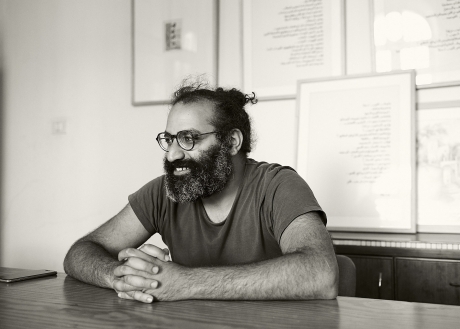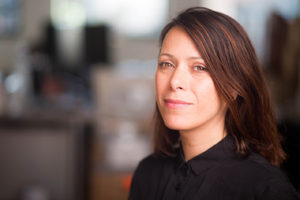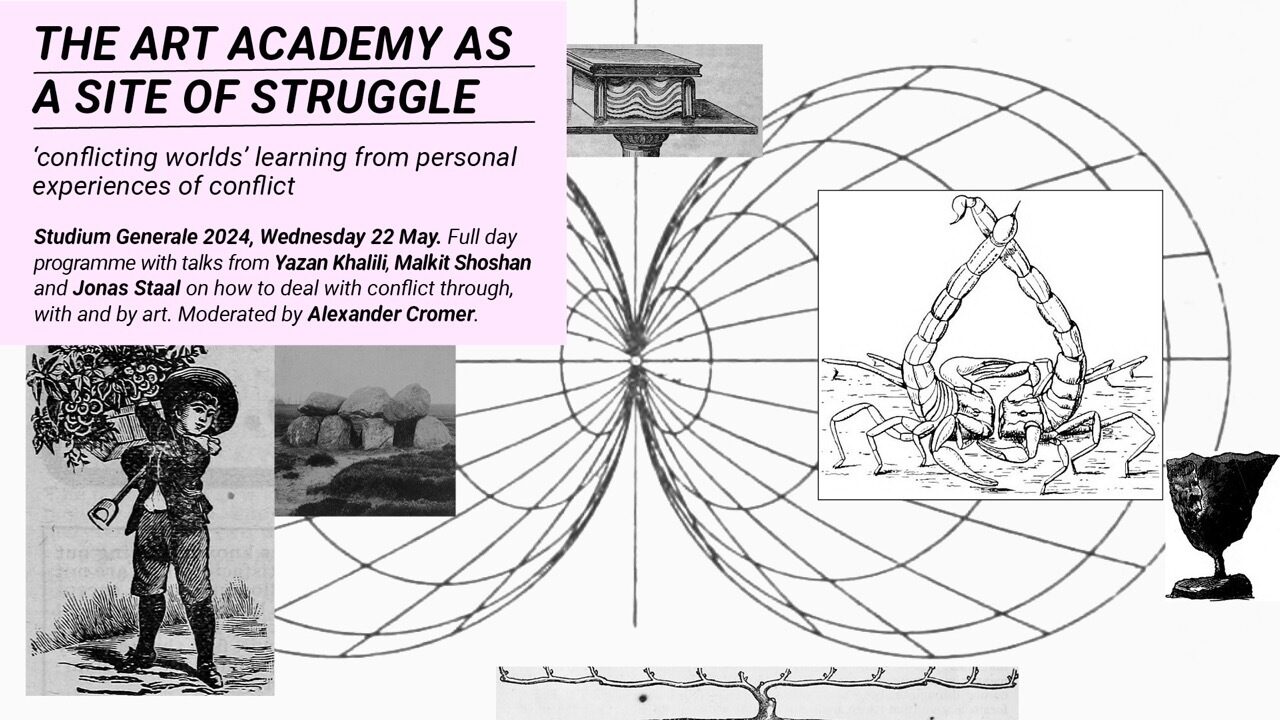This semester's Studium Generale is about conflicting worlds and the art academy as a site of struggle. On Wednesday 22 May, we will talk about how to deal with conflict in artistic practices and learn from personal experiences of conflict.
In the morning we will have an open discussion on the work of the three guests, Jonas Staal, Malkit Shoshan and Yazan Khalili, and your input requested by studium generale. The guests will talk with you about how they deal with conflict in their artistic practices. The morning programme will be moderated by Alexander Cromer.
After lunch (13:30), we start simultaneously in three big spaces at the academy in three break out sessions/workshops, each led by one of our guests. The basis for these sessions will be a combination of the material we have received from the request for input and the structure each quests chooses to give the workshop.
Read more about the guests:

Yazan Khalili is a visual artist, architect, and cultural activist. Khalili’s photography is detailed, reflective and full of intent. Using photography and the written word, Khalili unpacks historically constructed landscapes. Borrowing from cinematic language, images become frames where the spectator embodies the progression of time and narratives. He weaves together parallel stories over the years, forming both questions and paradoxes concerning scenery and the act of gazing, all of which are refracted through the prism of intimate politics and alienating poetics. In particular, he focuses on the effect of geographical distance on our rendering of territory, and its ability to heighten or arrest our political and sentimental attachments.
Born 1981. Works in and out of Palestine, currently based in Amsterdam, Netherlands, where he is a PhD candidate at Amsterdam School for Cultural Analysis (ASCA), University of Amsterdam. He is an architect, visual artist, and cultural producer. His works have been exhibited in several major exhibitions, including among others: Documenta fifteen 2022, KW, Berlin 2020, MoCA Torento 2020, New Photography, MoMA 2018, Jerusalem Lives, Palestinian Museum, 2017, Post-Peace, Kunstverein Stuttgart 2017, Shanghai Biennial 2016, Sharjah Biennial 2013. In 2020 he co-founded Radio Alhara, and in 2019 he co-founded The Question of Funding collective.

Malkit Shoshan is a designer, researcher, educator, writer, and the founding director of the architecture think-tank FAST: Foundation for Achieving Seamless Territory. FAST employs research, advocacy, design, and public art to explore and make visible the complex relations between architecture, urban planning, and human rights. Their cross-disciplinary work investigates the impact of systemic and spatial violence on people’s lived environments and aims to promote social and environmental justice through collaborative initiatives and designs. Shoshan is the 2024 Senior Loeb Fellow and a design critic in Urban Planning at Harvard University’s Graduate School of Design, a 2024 Bellagio resident, and a visiting scholar at NYU’s Institute for Public Knowledge. She is the author and mapmaker of the award-winning book Atlas of the Conflict, Israel-Palestine (010 Publishers, 2011), the co-author of Village: One Land Two Systems and Platform Paradise (Damiani Editore, 2014), and the author and illustrator of BLUE: The Architecture of UN Peacekeeping Missions (Actar, 2023). Her additional publications include Zoo, or the Letter Z, just after Zionism (NAiM, 2012), Drone (DPR-Barcelona, 2016), and Spaces of Conflict (JapSam books, 2016). Her work has been published and exhibited internationally. In 2016, she curated the Dutch pavilion, and in 2021, she was awarded, together with FAST, the Silver Lion at the Venice Architecture Biennale for their collaborative presentation "Border Ecologies and the Gaza Strip.

Jonas Staal is a visual artist whose work deals with the relation between art, democracy, and propaganda. He is the founder of the artistic and political organization New World Summit (2012–ongoing). Together with Florian Malzacher he co-directs the training camp Training for the Future (2018-ongoing), and with human rights lawyer Jan Fermon he initiated the collective action lawsuit Collectivize Facebook (2020-ongoing). With writer and lawyer Radha D’Souza he founded the Court for Intergenerational Climate Crimes (2021-ongoing) and with Laure Prouvost he is co-administrator of the Obscure Union.
Exhibition-projects include Museum as Parliament (with the Democratic Self-Administration of Rojava, Van Abbemuseum, Eindhoven, 2018-ongoing), We Demand a Million More Years (Fondazione Sandretto Re Rebaudengo, Turin, 2022) and Extinction Wars (with Radha D'Souza, Gwangju Museum of Art, 2023). His projects have been exhibited widely at venues such as the Cooper Hewitt Smithsonian Design Museum in New York, V&A in London, Stedelijk Museum in Amsterdam, M_HKA in Antwerp, Centre Pompidou-Metz and the Nam June Paik Art Center in Seoul, as well as the 7th Berlin Biennale, the 31st São Paulo Biennale, the 12th Taipei Biennale and the 14th Shanghai Biennale.
Publications include Steve Bannon: A Propaganda Retrospective (Het Nieuwe Instituut, 2018), Propaganda Art in the 21st Century (The MIT Press, 2019) and Training for the Future Handbook (With co-editor Florian Malzacher, Sternberg Press, 2021). Staal completed his PhD research on propaganda art at the PhDArts program of Leiden University, the Netherlands.
KABK students, what’s your view?
Send your input to studiumgenerale@kabk.nl. You can do this until Monday 22 April 23:59.
Share your personal experience, proposal, artistic reflection in a text or a visual to be added to the digital reader publication. The digital reader will be part of the morning presentation and talk with Yazan Khalili, Malkit Shoshan and Jonas Staal on Wednesday 22 May.
The art academy aims to be a space where students feel free to articulate their views on global societal issues, not only in class discussions but also in their artwork and in their actions. In times of major geo-political conflicts with disastrous consequences that affect us all, we are left with many questions for reflection:
- How can students and tutors provide space at the academy to discuss sensitive and polarizing matters?
- Should and how does the academy take a position to uphold human rights?
- What are methods for reflections be incorporated by students in their work?
Details
Datum
Locatie
Meer info
For additional info contact Stéphane Blokhuis
